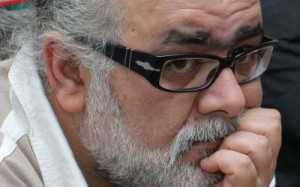 According to Mikael Danielyan, the chairman of the Helsinki Association, the bill banning the denial of genocides passed by the French parliament is a violation of the right to freedom of expression. He expressed such a notion during a conversation with Aravot.am. M. Danielyan thinks that it should not be in a form of a bill and aim at holding people accountable, “It is human’s right to freedom of expression to admit or not admit something. I am against such bills and I think that if someone denies, it should not be a subject of criminal responsibility. Human’s right to freedom of expression remains higher.”
According to Mikael Danielyan, the chairman of the Helsinki Association, the bill banning the denial of genocides passed by the French parliament is a violation of the right to freedom of expression. He expressed such a notion during a conversation with Aravot.am. M. Danielyan thinks that it should not be in a form of a bill and aim at holding people accountable, “It is human’s right to freedom of expression to admit or not admit something. I am against such bills and I think that if someone denies, it should not be a subject of criminal responsibility. Human’s right to freedom of expression remains higher.”
Political scientist Stepan Grigoryan, the director of the Analytical Center on Globalization and Regional Cooperation, expressed an opposite idea during a conversation with us, “I don’t think that it can be perceived as a violation of the right to freedom of expression. Provided the Holocaust is recognized around the world, almost in every country the denial of the Holocaust is criminalized. It means that not recognizing or denying the Holocaust is punishable. It has nothing to do with restraining the human rights. It is obvious that people who deny that must be held accountable both internationally and in their own country. The fact of the Armenian Genocide is recognized by around 20 countries, also by EU, various international organizations, therefore that fact is well-known.”
Let us mention that according to the Turkish Zaman newspaper, Turkish Prime Minister Recep Tayyip Erdoğan severely criticized the decision of the French Senate, “Unfortunately, all this was related to Sarkozy’s political ambitions. Now I ask is there a freedom of speech in France? And I answer no. They have destroyed the atmosphere of free debate.”
He is convinced that the bill will be finally ratified, “President Sarkozy will not use the right to veto, and that bill passed by the Senate will be ratified and will finally become a law. If Nicolas Sarkozy had been against, the government of France would have actively worked with the members of the Senate in order that it wasn’t passed. It is obvious that there has been no pressure on the MPs imposed by the government, so we have no doubt that this law will be finally ratified.”
In response to a question what impact would the passing of this bill have, S. Grigoryan said that Turkey’s first reaction would be painful, but eventually, that country would reconcile to the fact that France was a powerful country, a permanent member of the UN Security Council and messing with such a country would have serious repercussions. According to him, the political fuss may be big, by calling back the ambassador, the relations may transfer to the level of the ambassador’s deputy, but S. Grigoryan doesn’t think that France will suffer big losses in the field of economics. On the contrary, it is not ruled out that showing such an attitude, Turkey may face problems herself.
Turkey has already stated about stopping military cooperation with France. As for imposing various sanctions by that country, the political scientist thinks that France doesn’t fear those steps, “Let us not forget that France is a powerful country herself. France is backed by EU. What is a sanction against France – e.g. if Turkey tries to impose some economic or commercial sanctions against France, she will automatically confront the European Union.”
In response to our question whether the step of passing the bill by France was not conditioned by the fact that the country tried to attract the attention of the Armenian community during the upcoming election and thereby win votes, the political scientist noted that it was not the main factor, “There are roughly half a million Armenians in France, they have nearly 200 thousand votes. It is not such a big influence, so that to make France oppose Turkey.” According to the political scientist, France had a few reasons for passing that bill, one of which, according to him, was related to restoring historical justice and the main reason was, “Turkey has shown big ambitions in the Arab, Muslim world recently. Turkey tries to become a leader in the region in regard to the Arab Spring and revolutions, including the countries of North Africa. It is obvious that France doesn’t like it.” Our interlocutor thinks that passing the bill is not the last step taken by France against Turkey. In his words, the period of rivalry has just started, “Turkey is becoming more powerful and clashing with the interests of other countries, first of all France and Italy and there will be new steps taken by those countries in the short-run.”
Lusine KHACHATRYAN
www.aravot.am, DECEMBER 22, 2011

Leave a Reply